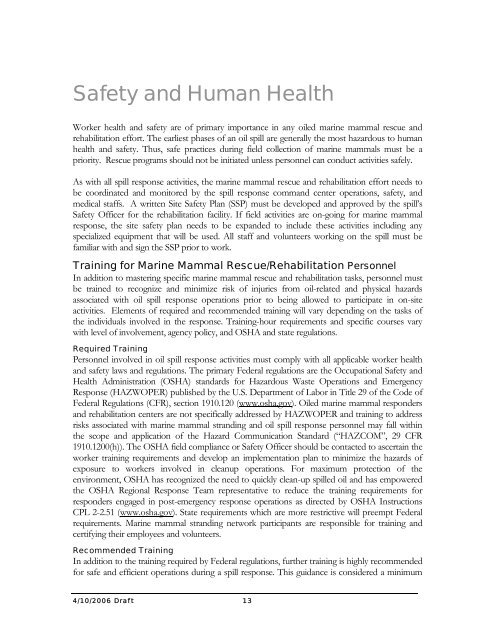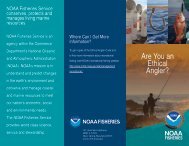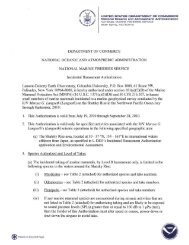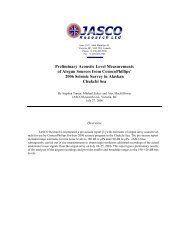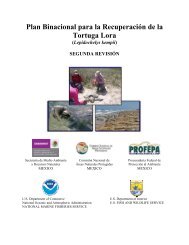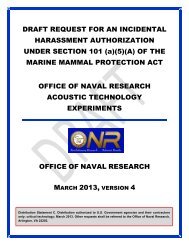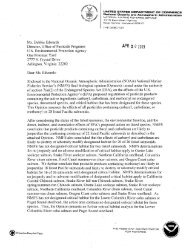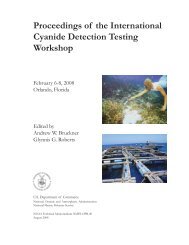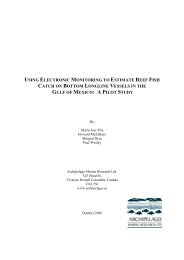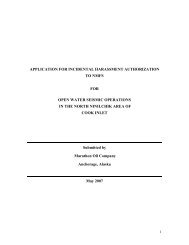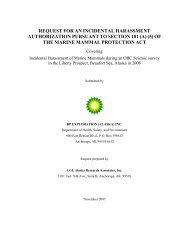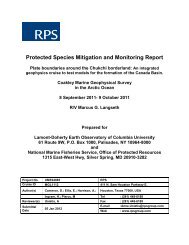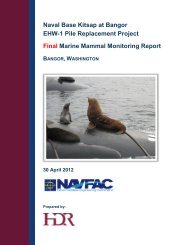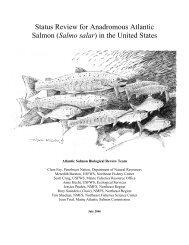Volume III, Appendices EM - National Marine Fisheries Service ...
Volume III, Appendices EM - National Marine Fisheries Service ...
Volume III, Appendices EM - National Marine Fisheries Service ...
You also want an ePaper? Increase the reach of your titles
YUMPU automatically turns print PDFs into web optimized ePapers that Google loves.
Safety and Human Health<br />
Worker health and safety are of primary importance in any oiled marine mammal rescue and<br />
rehabilitation effort. The earliest phases of an oil spill are generally the most hazardous to human<br />
health and safety. Thus, safe practices during field collection of marine mammals must be a<br />
priority. Rescue programs should not be initiated unless personnel can conduct activities safely.<br />
As with all spill response activities, the marine mammal rescue and rehabilitation effort needs to<br />
be coordinated and monitored by the spill response command center operations, safety, and<br />
medical staffs. A written Site Safety Plan (SSP) must be developed and approved by the spill’s<br />
Safety Officer for the rehabilitation facility. If field activities are on-going for marine mammal<br />
response, the site safety plan needs to be expanded to include these activities including any<br />
specialized equipment that will be used. All staff and volunteers working on the spill must be<br />
familiar with and sign the SSP prior to work.<br />
Training for <strong>Marine</strong> Mammal Rescue/Rehabilitation Personnel<br />
In addition to mastering specific marine mammal rescue and rehabilitation tasks, personnel must<br />
be trained to recognize and minimize risk of injuries from oil-related and physical hazards<br />
associated with oil spill response operations prior to being allowed to participate in on-site<br />
activities. Elements of required and recommended training will vary depending on the tasks of<br />
the individuals involved in the response. Training-hour requirements and specific courses vary<br />
with level of involvement, agency policy, and OSHA and state regulations.<br />
Required Training<br />
Personnel involved in oil spill response activities must comply with all applicable worker health<br />
and safety laws and regulations. The primary Federal regulations are the Occupational Safety and<br />
Health Administration (OSHA) standards for Hazardous Waste Operations and Emergency<br />
Response (HAZWOPER) published by the U.S. Department of Labor in Title 29 of the Code of<br />
Federal Regulations (CFR), section 1910.120 (www.osha.gov). Oiled marine mammal responders<br />
and rehabilitation centers are not specifically addressed by HAZWOPER and training to address<br />
risks associated with marine mammal stranding and oil spill response personnel may fall within<br />
the scope and application of the Hazard Communication Standard (“HAZCOM”, 29 CFR<br />
1910.1200(h)). The OSHA field compliance or Safety Officer should be contacted to ascertain the<br />
worker training requirements and develop an implementation plan to minimize the hazards of<br />
exposure to workers involved in cleanup operations. For maximum protection of the<br />
environment, OSHA has recognized the need to quickly clean-up spilled oil and has empowered<br />
the OSHA Regional Response Team representative to reduce the training requirements for<br />
responders engaged in post-emergency response operations as directed by OSHA Instructions<br />
CPL 2-2.51 (www.osha.gov). State requirements which are more restrictive will preempt Federal<br />
requirements. <strong>Marine</strong> mammal stranding network participants are responsible for training and<br />
certifying their employees and volunteers.<br />
Recommended Training<br />
In addition to the training required by Federal regulations, further training is highly recommended<br />
for safe and efficient operations during a spill response. This guidance is considered a minimum<br />
4/10/2006 Draf t 13


